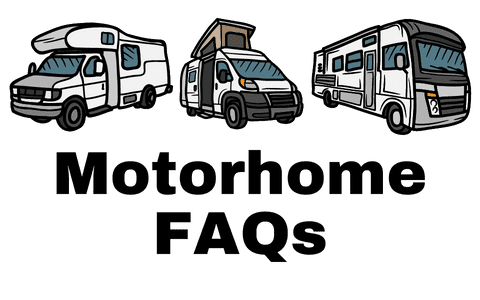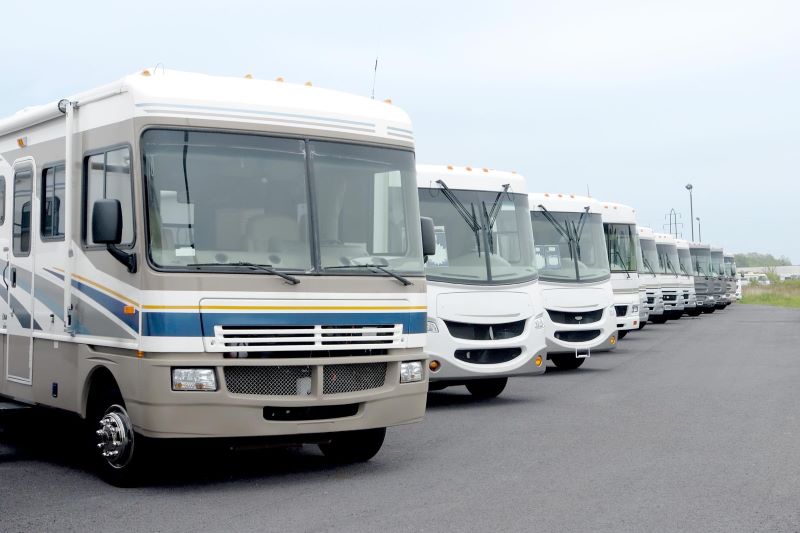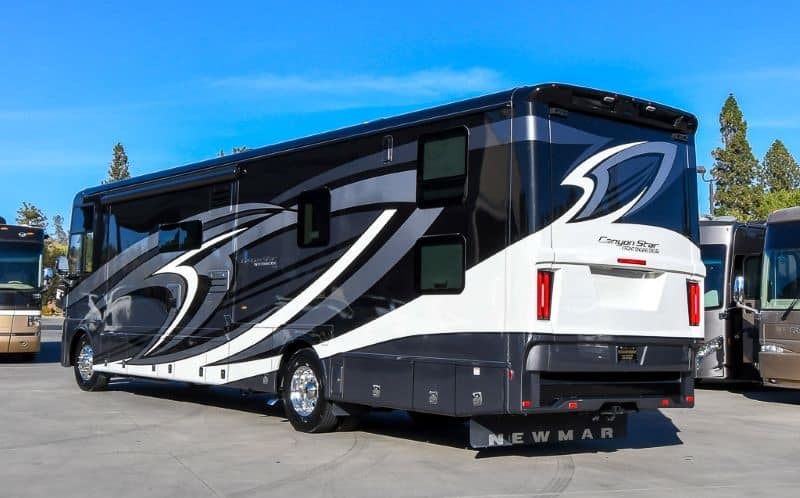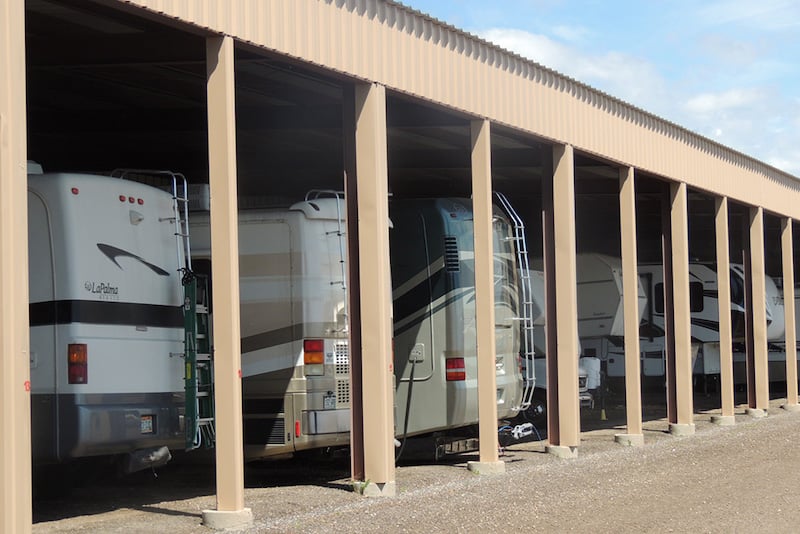All of the experts keep saying RV prices are starting to fall, but when you consider the markup on motorhomes, how much negotiating room do you really have? Depending on the health of the market at any given time, dealers mark up RVs between 20% and 40%.
Fortunately, the markup on motorhomes is a relatively simple calculation in the grand scheme of business dealings and finance. But the term markup means the same thing whether you’re purchasing an RV or a bowling ball.
All markup means is the difference between the manufacturer’s recommended price and the price set by the dealer. You see this at work in several ways, though MSRP is more of a concept (and a vague one at that) when it comes to the markup in motorhomes.
What is the MSRP of a Motorhome?
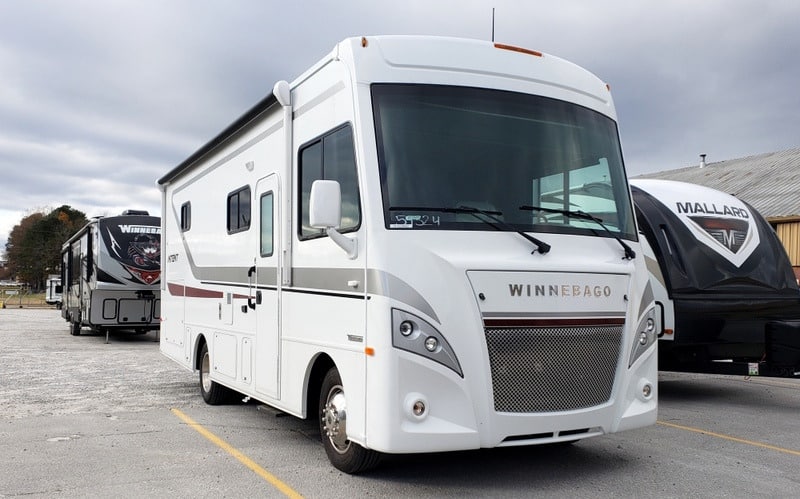
MSRP stands for “Manufacturer Suggested Retail Price.” It’s a price that represents what the manufacturer recommends and covers profit margins for the manufacturer, the dealer, and any go-betweens. It’s not a set price, and you will often see a lower or higher price, depending on the RV dealership you’re walking through.
In fact, MSRP (when it comes to the RV industry) is more of a political tool manufacturers use with dealerships. As far as you’re concerned, it’s a number and a particularly meaningless one at that. You’ll get the drift when you jump on an RV website and see all those crossed-out MSRPs.
How Much Do Dealers Markup Motorhome Prices?
Depending on the health of the market at any given time, dealers mark up RVs between 20% and 40%. Notice the term “RVs” is used rather than motorhomes because all campers are typically lumped together.
However, the MSRP itself is inflated, and manufacturers provide a wide array of incentives for the dealers. So, more often than not, dealers are not purchasing RVs at the MSRP but well below it.
According to Kevin Frazer, founder and owner of Cheyenne Camping Center. “There is no such thing as MSRP in the RV industry. It’s all politics.” In a lot of ways, that’s a good thing because knowing how the industry works empowers you at the negotiating table.
What is the Average Dealer Profit on a Motorhome?
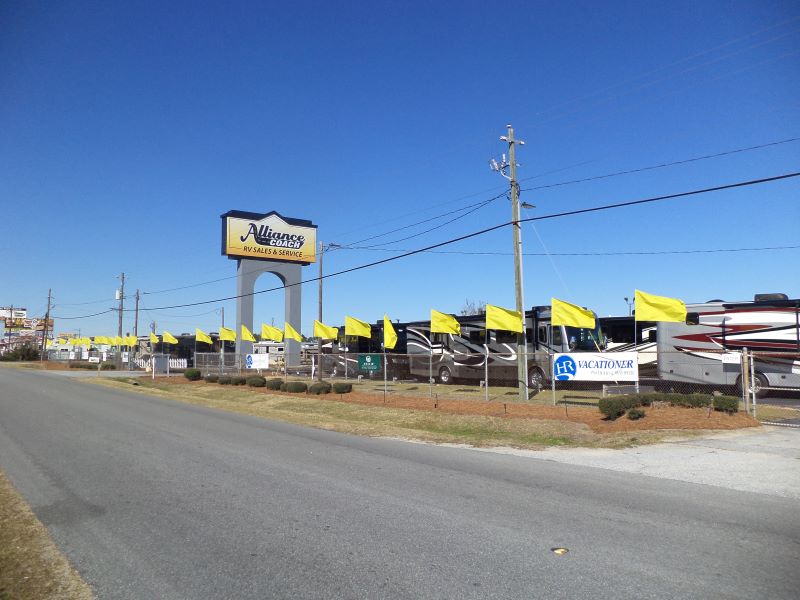
In the last couple of years, the net profit for dealers around the country averaged 11.1%. However, it’s important to remember that these last couple of years have been a boom for the RV industry, mostly because of the COVID-19 pandemic.
According to RVDA’s numbers, the 11.1% profits are double what they have typically been. Between 2011 and 2019, those numbers were half what they are now. In 2023, analysts forecast a slump in the RV industry so that we may see a return to the more traditional profit numbers.
Should I Pay MSRP for a Motorhome?
No, you should never pay MSRP for a motorhome. First, most dealers will offer well below the supposed MSRP for a motorhome. Second, you should spend a great deal of time researching before purchasing an RV. Your research will tell you the same thing.
Negotiating is a major part of the game here. There are advertising and dealer prep fees (among many others) that you need to get written out of the final sale price (if possible). You have a raw deal if you pay the full MSRP on a motorhome.
How Much Below MSRP Should I Pay for a Motorhome?
Since we’ve established that MSRP—when it comes to motorhomes and all other RVs—is a figment of some CEO’s imagination somewhere, you have some wiggle room, and it starts behind your computer screen.
Let’s say your set on a motorhome, and the MSRP is $185,850. Since it cost the manufacturer far less to produce this motorhome, we know that the actual MSRP is less of a rule and more of a maneuver between the manufacturer and various dealers.
You’ll notice that when you jump on an RV dealer’s website, you’ll see a ton of steeply discounted motorhomes, and they’re always certain to stick that MSRP up there for you to see. If the MSRP is $185,850, the dealer will likely procure it for $120,000 or less.
At 25% off, the price is $139,388; unbeknownst to you, the price the dealer paid for the motorhome from the manufacturer could have been a little less than $120,000. The dealer has to cover their operational costs and also make a profit; otherwise, they would go out of business. But it’s good to know they’re already ahead of the game before you sit down at the negotiating table.
The MSRP and the markup of motorhomes include all the various fees to run the dealer’s operational costs. But the reality is all of those operational costs are already in the base price. So when the sales representative talks about how a certain fee pays Sally in the titling office, don’t worry; Sally will still get her paycheck no matter what the final price you pay.
You can start with as high a percentage off the MSRP as you want but never settle for less than 20% off.
How Much Can You Negotiate with a Dealer on a Motorhome?
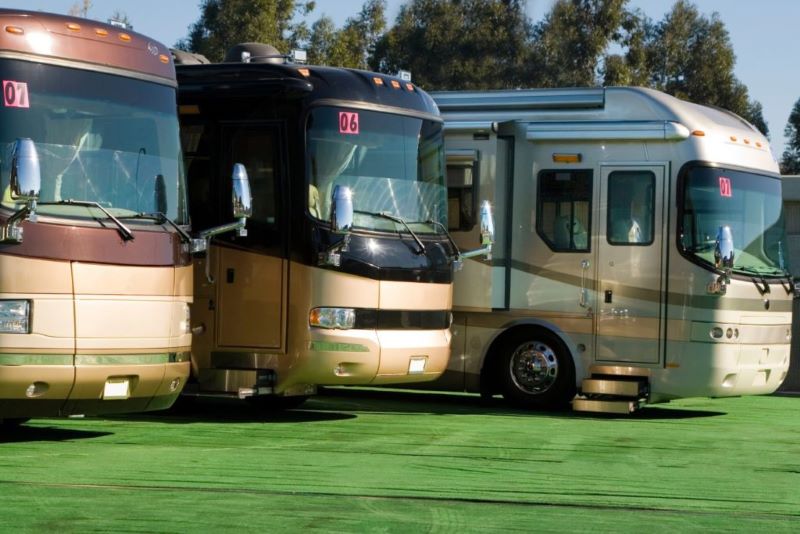
When you walk in, your primary goal at the desk is maintaining the resolve to walk away. How much you negotiate is entirely up to you, not the dealer. Your second goal is to determine the hidden fees and eliminate them. If the dealer refuses, head to one of the many other nearby RV dealerships.
One of the sales representative’s main objectives is to make you feel like the motorhome or travel trailer you have chosen on their lot is the only one in the area that meets your needs and wants. More than likely, the 2-4 other RV lots nearby have something similar with the floor plan and features you want.
You also have more negotiating power if you secure your financing before showing up at the RV dealership. Better yet, forget the RV dealership and go to an RV show. Get there on day one, and you’ll find they are far more open to negotiation because they want to be the first on the board in sales.
Is it Cheaper to Buy an RV from a Dealer or a Manufacturer?
In some ways, you can save money going directly to the manufacturer rather than the dealer. Unfortunately, many of the major brands only sell through dealers, so wipe them off the slate right off the bat.
There are roughly 40 or so RV manufacturers that sell factory direct, and when it comes to Class A motorhomes only, that list shrinks drastically. If you want to buy directly from the manufacturer, truck campers, van conversions, and fiberglass travel trailers are the most popular.
It’s hard to say if buying factory direct will save you money in the long run. There are a few reasons for this. For one, most major manufacturers have a solid bead in the industry and don’t have to pay as much as some smaller dealers. Airstream and Bowlus are probably the lone exceptions there.
Now that Lazy Days RV, the Class C RV manufacturer, is out of business, it’s easier to find towable trailer manufacturers that sell directly than drivable motorhomes. Some do still exist, but they mainly focus on expedition vehicles or permanently mounted truck campers on your new or used pickup truck.
If or when you do find an RV manufacturer that sells direct, you will find that their prices are set. They do not negotiate on pricing their custom build RVs or used models. What they will do is work within your budget.
So if you have $30,000 to spend and you upgrade your new custom build beyond that price, their sales rep will help you readjust things by sacrificing certain features to make the price work for you.
Is 25% Below Motorhome MSRP a Good Deal?
When you consider the fact that “MSRP” isn’t a real price on the markup in motorhomes but more of a suggestion, “25% off” is difficult to calculate in terms of advantages versus disadvantages. For the most part, you should consider 25% a decent deal.
Is it the absolute best in the world? No, probably not, but it’s far from the worst deal, and it is better than paying the full MSRP.
5 Tips for Negotiating with Motorhome Sales Representatives
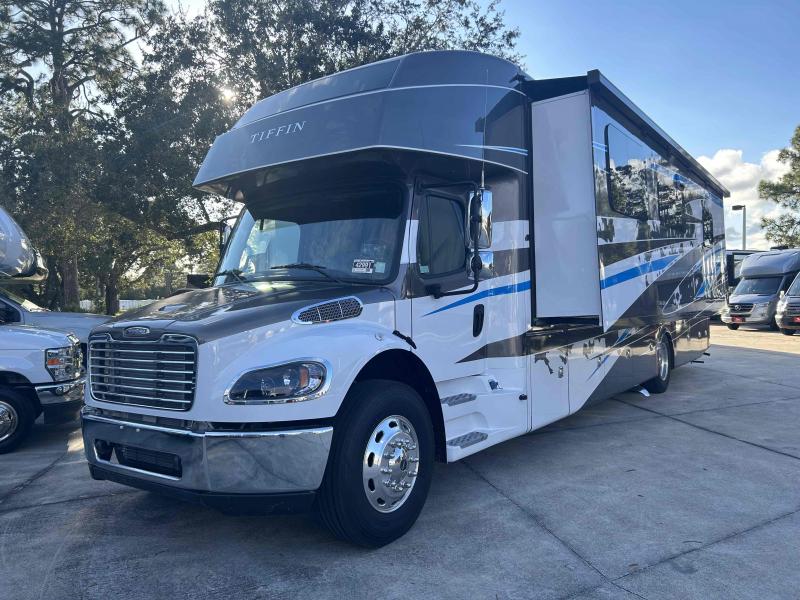
The most important tip when entering into any negotiation on the markup of motorhomes is to put your business face on. Nothing is personal. The dealer is not there to wreck your day or hurt your feelings. Their goal is to make as much money as possible for the business they work for and, as a result, themselves as well.
1. Don’t Say Too Much
As Emily Dickson so eloquently put it, “Saying nothing sometimes says the most.” It’s an excellent approach. Don’t give away the game before everything has played out. Whether you have secured separate financing or not, don’t let the dealer know your financial situation.
The dealer will play this game as well, remaining quiet to place pressure on the customer. That’s okay. Talk about your day, how one of the kids rode a bicycle for the first time, or how you saw bigfoot that one time when you were at the laundromat.
The point is, it’s not necessarily remaining quiet so much as it is remaining uninformative. The more the dealer knows about you and what you want, the more leverage they have in their own sales pitch.
Keep your credit or debit card in your hand the entire time. It doesn’t matter if you’re never going to use it or not. It’s highly distracting and keeps the salesman in front of you constantly believing they are close to securing a deal.
2. Have a Realistic Price in Mind
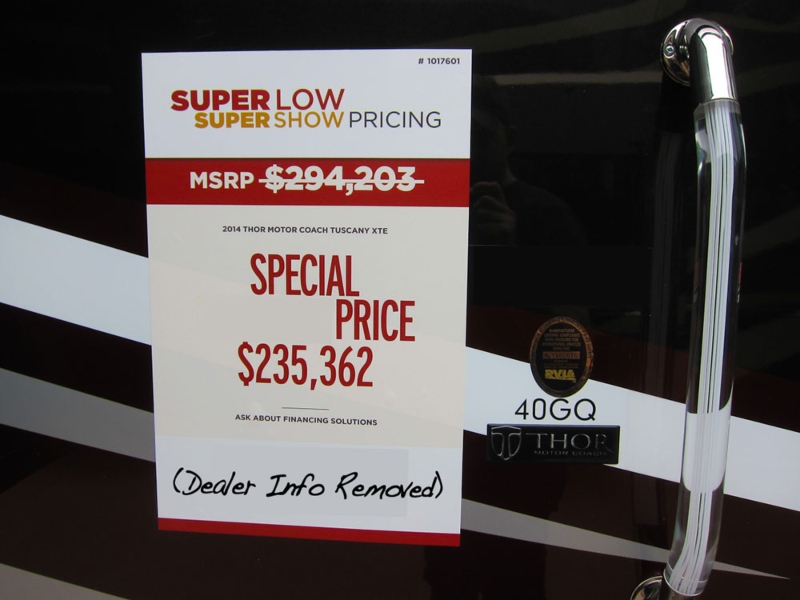
Given the above information, it’s simple enough to sit down and gauge what the dealer probably paid for the motorhome. Don’t worry; they didn’t pay MSRP. When you scan down the list of RVs on the list, you’ll probably see the acronym MSRP with a line through it on every listing.
The percentage off the MSRP often accompanies the number below the MSRP. This lower number is not what the dealer paid for the RV. If they sold RVs below what they paid for them, they’d never make any money.
Take 10% off that number, and you’re creeping into the ballpark. Somewhere between 10% and 30% off the listed price, after the percentage off MSRP, is where you want to start negotiating.
3. Time it Right
You should always focus your search at the end of the model year (usually around July-September). Most RV dealers are trying to push their stock off the lot in preparation for new stock. Plus, dealers are aiming to reach their annual targets.
It’s not like they’ll be in desperation mode or anything, and you should apply plenty of patience and research. But they are getting a little antsy about selling their motorhomes at this point, and that’s advantageous to you.
Another good time is right before winter hits. Once the snow is on the ground, RV sales plummet. The bad part is that you have to figure out where to store the RV, but you should already have that expense figured out before buying anyway.
4. Shop Around and Know the Market Value
Shopping for an RV is just like any other large transaction. Never go with the first choice. Plus, you must do your due diligence and compare prices throughout your local area. You can check prices outside your local area, within driving distance.
Don’t be afraid to search online, either. The more knowledge you have about a given RV, the better your position when standing in front of the dealer.
5. Don’t Budge from Your Price
For the most part, a brand-new motorhome is not a “need.” It is a “want.” That means you have a lot of freedom. Stand firm on your price, do not allow the dealer to persuade you, and don’t be afraid to walk away if you can’t reach an agreement.
You’ll often find that walking away, especially if you follow the above tips, will be enough to bring the dealer running back. You’ll be surprised at the results you get from simply walking away.
PRO TIP:
If you want to learn how to buy the right RV and save thousands of dollars, we highly recommend the video course from Mark Polk called Buy the Right RV and Save Thousands. We have used his courses ourselves and they will save you lots of time and even more money!
Final Thoughts on Dealer Markup of Motorhomes
Dealers often get a very bad rep in the RV industry. Pull up any RV forum under the “dealership” subject, and you’ll see rage and venting as you’ve never seen elsewhere. However, it’s important to recognize that it’s their job to make a profit for their dealership.
It’s also their job to make money for themselves, support their families, and pay the bills. That doesn’t mean you should give them an inch of ground in negotiations. But be prepared for most of your time at the dealership at the desk, finding an agreeable price if you stick to your guns no matter what.
Dealerships also have an established methodology in which MSRP plays a part in the markup of motorhomes, but only insofar as the political games of business. MSRP only means something to the dealerships and manufacturers and, ultimately, very little to you.
Keep that in mind when you set your negotiation price once you find the perfect motorhome.
About the Author:
Thomas Godwin is a full-time freelance writer with a BFA in Creative Writing, a U.S. Marine, and an avid outdoorsman.
When he’s not writing, he’s raising chickens and Appleyard ducks. Thomas also constructs teardrop campers (attempting to anyway) and kayaks the Blackwater River with his wife, two daughters, and his Dobermans.

